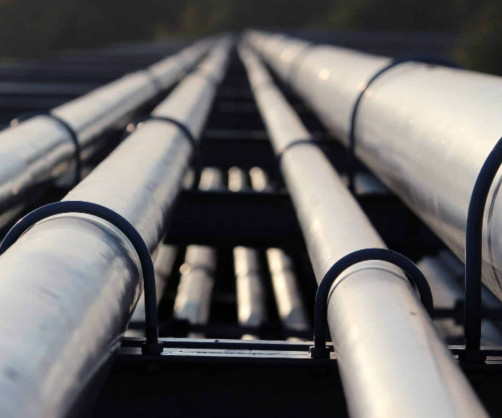
Three significant developments in Africa’s energy landscape made headlines this past month: the East African Crude Oil Pipeline (EACOP) reached 60% completion, the Republic of Congo finalized a pipeline cooperation agreement with Russia, and Nigeria and Equatorial Guinea signed a deal to advance a joint natural gas pipeline. These milestones underscore increasing momentum behind transnational pipeline projects in Africa, which are not only critical to unlocking hydrocarbon value chains, but also pivotal to industrial growth, regional cooperation and efforts to end energy poverty.
With African Energy Week (AEW) 2025: Invest in African Energies set to take place in Cape Town from September 29 to October 3, recent advances in the midstream sector underscore the growing role of large-scale infrastructure in securing Africa’s energy future. AEW 2025 will provide a platform to unpack how strategic partnerships and regional integration can transform pipelines from isolated projects into engines of inclusive development.
EACOP: Connecting Uganda to Global Markets
The 1,443-km EACOP is set to link Uganda’s oil fields in the Lake Albert region to the port of Tanga in Tanzania, facilitating the export of up to 246,000 barrels per day. With 60% of the project now completed – including land acquisition, environmental approvals and construction – EACOP is on track to become the longest heated crude oil pipeline in the world.
More than just a logistical asset, EACOP represents a critical economic corridor. It is expected to generate thousands of jobs, stimulate local content and unlock ancillary infrastructure such as roads, storage facilities and power lines. By enabling Uganda to monetize its crude reserves, the pipeline also enhances fiscal revenues that can be reinvested into energy access, education and healthcare. At AEW 2025, stakeholders will explore how flagship projects like EACOP can be used as case studies for balancing investment, environmental responsibility and community development, while ensuring African nations retain sovereignty over their resources.
Russia-Congo Deal: A New Axis in Pipeline Diplomacy
Just days after the EACOP update, Russia ratified a bilateral agreement with the Republic of Congo for the construction of the Pointe-Noire-Loutete-Maloukou-Trechot oil pipeline. The agreement lays the groundwork for joint efforts in planning, financing, construction and operation of the pipeline, set to be completed in three years. The move strengthens energy ties between the two countries and opens the door for Russian investment in Congo’s midstream sector, potentially accelerating the development of critical infrastructure needed to monetize and export the country’s hydrocarbon resources.
It also signals a shift in Africa’s external energy partnerships, with Congo turning to non-Western allies to build out its infrastructure and secure long-term offtake agreements. It reinforces the idea that diversified geopolitical engagement can help African nations close the infrastructure gap faster, provided partnerships are structured transparently and with shared development objectives. As African countries look to strengthen global cooperation, AEW 2025 will offer a space to evaluate new alliances, discuss risk-sharing mechanisms and align infrastructure development with continental priorities under the African Union’s Agenda 2063.
Nigeria-Equatorial Guinea: A Boost for West African Gas Integration
A recent agreement between Nigeria and Equatorial Guinea, signed on June 18, aims to fast-track the development of a joint natural gas pipeline, designed to increase cross-border gas trade and support export capacity. This project is expected to deepen energy cooperation between the two countries, facilitate access to cleaner fuels and contribute to the diversification of energy sources in the region. It also exemplifies how collaborative infrastructure development can unlock new economic opportunities, stimulate investments and enhance regional energy security.
Midstream infrastructure companies are also stepping up efforts to improve regional gas trade and distribution. The West African Gas Pipeline Company, backed by Chevron among other shareholders, operates a vital pipeline that transports Nigerian gas to Benin, Togo and Ghana. This pipeline supports power generation and industrial use across multiple West African countries and plays a key role in diversifying the regional energy mix and promoting cross-border gas trade. Meanwhile, the Republic of Mozambique Pipeline Investments Company, which manages the Mozambique-South Africa Gas Pipeline, recently opened a new office in Maputo, aiming to strengthen regional gas connectivity and market integration.
Pipelines and the Fight Against Energy Poverty
While Africa accounts for 17% of the global population, it accounts for just 3.3% of global power generation. Energy poverty remains a major constraint on industrialization, education, healthcare and entrepreneurship. Pipelines, by moving fuel to where it is needed most – across borders and into domestic markets – can help address this imbalance.
“In addition to exporting crude, new pipelines have the potential to deliver LPG and natural gas to underserved regions, reducing dependence on biomass and accelerating the shift toward cleaner household and industrial energy,” says NJ Ayuk, Executive Chairman, African Energy Chamber, adding that coordinated planning between countries can ensure pipelines are multi-purpose and scalable, with clear economic multipliers for local populations.
“AEW 2025 will shine a light on the role of pipelines in achieving universal energy access, examining regulatory frameworks, project finance models and technology solutions that can make these developments more inclusive and efficient,” he notes.
Distributed by APO Group on behalf of African Energy Chamber.
AEW: Invest in African Energies
AEW: Invest in African Energies is the platform of choice for project operators, financiers, technology providers and government, and has emerged as the official place to sign deals in African energy. Visit www.AECWeek.com for more information about this exciting event.


